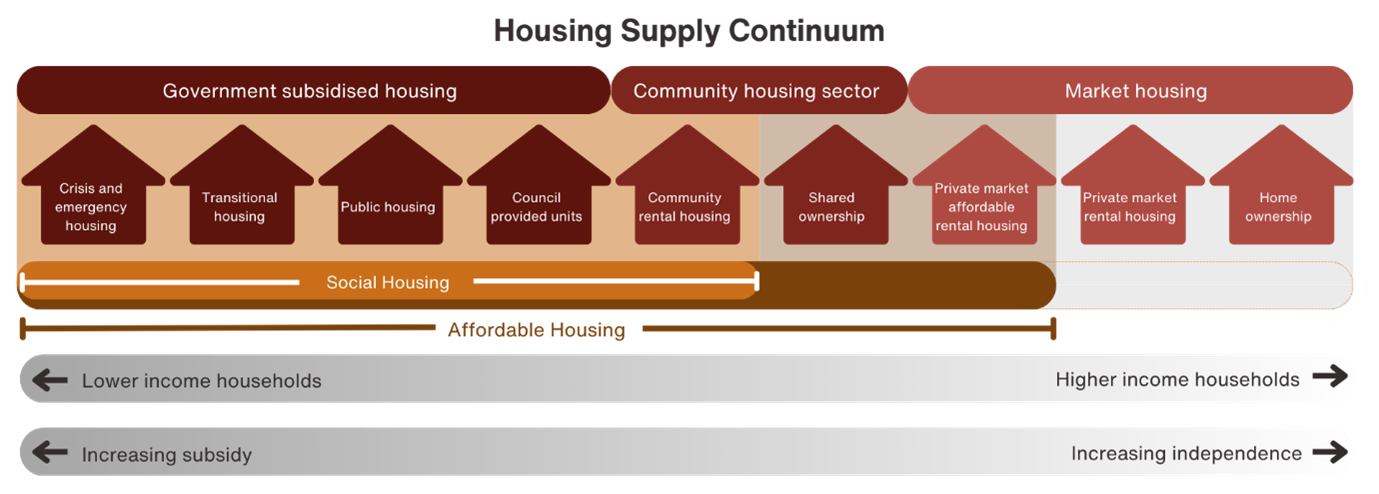Homelessness and housing support

We recognise that homelessness is a growing issue affecting people of all ages and backgrounds. Even a short period of homelessness can have a significant impact on a person's wellbeing.
People experiencing homelessness in our community may be couch surfing, living in overcrowded housing, staying in their vehicle, camping, in emergency accommodation, or sleeping rough.
We are committed to working collaboratively with local service providers, community groups, and government agencies who play a role in supporting people who are homeless or at risk of homelessness.
What is homelessness?
The Australian Bureau of Statistics (ABS) defines homelessness as a situation where a person does not have suitable accommodation alternatives and their current living arrangement:
- is in a dwelling that is inadequate; or
- has no tenure, or if their tenure is short-term and not extendable; or
- does not allow them to have control of, and access to space for social relations.
Homelessness takes many forms, including:
- Primary homelessness - sleeping rough, in cars, in improvised dwellings, or squatting.
- Secondary homelessness - staying in crisis or emergency accommodation, refuges, or couch surfing with friends or family.
- Tertiary homelessness - living in severely overcrowded housing or in rooming/boarding houses without adequate facilities.
What are the causes of homelessness?
Homelessness is caused by a combination of social, economic, and health-related factors, including:
- Family and/or relationship breakdown
- Domestic or family violence
- Physical and/or mental health issues
- Substance misuse
- A shortage of affordable housing
- Rising living costs
- Unemployment or job loss
People of all ages and backgrounds are at risk of being homeless. Even a short period of homelessness can have a profound impact on the lifetime wellbeing of an individual.
What should I do if I see someone sleeping rough or need homelessness support?
Council recognises the rights of all community members to access public spaces while also ensuring that people experiencing homelessness receive appropriate support.
Council may receive reports that are referred to our Local Laws Unit if there are potential breaches of local or state laws. In such cases, Council Officers work closely with local police to assess any risks or potential criminal activity while also collaborating with homelessness support agencies to provide outreach and assistance. Our approach follows Victoria’s Charter of Human Rights and Responsibilities, ensuring people are treated with care, respect, and dignity.
If you or someone you know needs emergency accommodation or homelessness support, contact:
- Sunbury Cobaw Community Health (Monday- Friday 9am-5pm): (03) 5421 1666
- Launch Housing Emergency Accommodation Crisis Line (after-hours): 1800 825 955
If you feel a person may be a danger to themselves or others, or if they have a child under 18 years old with them, call triple zero (000).
For more information about other local contacts, see Emergency and support services
What is Council doing in response to homelessness?
We are committed to:
- providing information about where to access housing and support services
- working with local service providers to ensure timely referrals for assistance
- monitoring homelessness trends in the region and advocating for systemic change
- raising community awareness about homelessness and its causes.
Council’s Affordable Housing Policy commits to supporting those at risk of homelessness. We align with the Victorian Aboriginal Housing and Homelessness Framework and the National Housing and Homelessness Plan.
Understanding housing options
The Housing Supply Continuum shows a range of housing options from crisis and emergency housing through to home ownership.

These options are grouped into three broad categories:
1. Government Subsidised Housing
- Crisis and emergency housing
- Transitional housing
- Public housing
- Council-provided units
2. Community Housing Sector
- Community rental housing
- Shared ownership
3. Market Housing
- Private market affordable rental housing
- Private market rental housing
- Home ownership
The housing continuum shows the different types of housing available, from options for people with low incomes who need the most help, through to people with higher incomes who can live more independently.
Affordable housing means housing those costs less than regular market housing and is suitable for people on low to moderate incomes. It includes different types of housing such as social housing, shared ownership and cheaper private rental housing. Affordable housing helps people pay for housing while still being able to afford other basic needs like food, transport and healthcare.
Social housing is one type of affordable housing. It is usually at the more supported end of the continuum and is for people with very low incomes or who need extra support. It includes public housing (which is run by the government) and community housing which is managed by not-for-profit organisations.
Council plays a role in the housing continuum by advocating for increased social and affordable housing, supporting partnerships with housing providers, and planning for future housing needs to help ensure a diverse range of housing options are available in the community.
How you can help
Community members can contribute to addressing homelessness by:
- reporting concerns about rough sleeping to relevant support services
- supporting local housing initiatives and advocacy efforts
- learning more about housing challenges and solutions in the Macedon Ranges.
Other useful resources
Department of Families, Fairness and Housing - Bendigo Office
Tenants Victoria (Rental rights and advice)
Ask Izzy (Search for local support services)